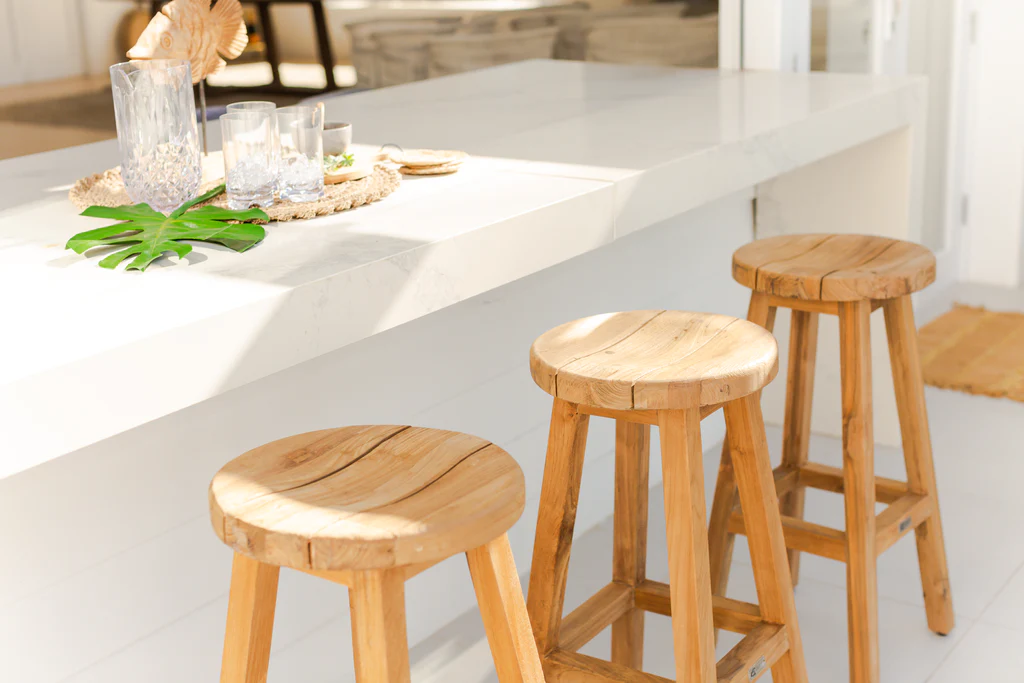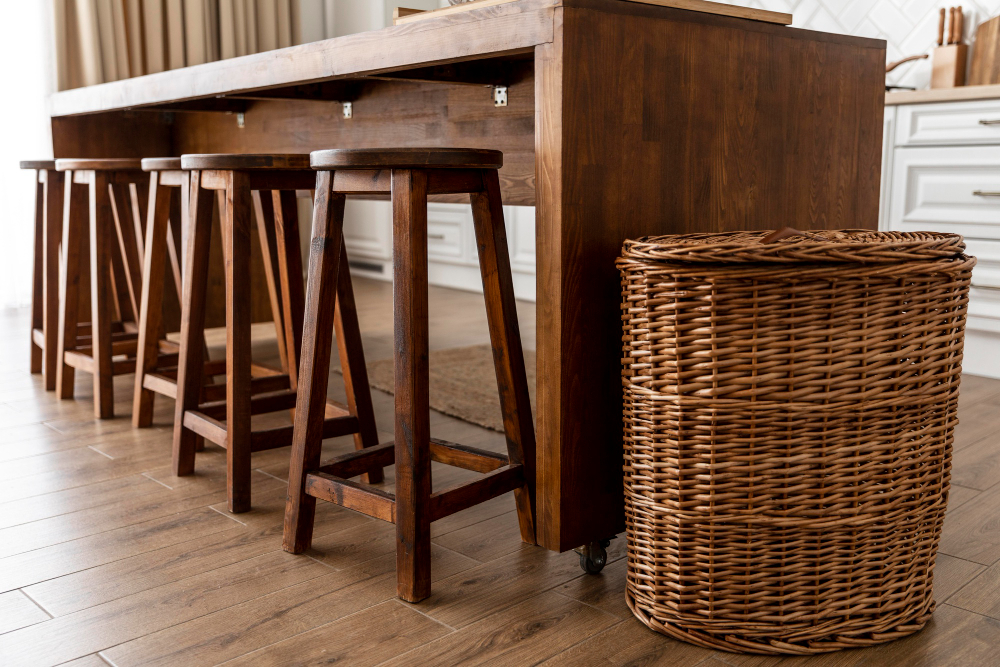Detail Guide On Eco-Friendly Bar Stool
- 1 Need For Eco-Friendly Bar Stool
- 2 Sustainable material For Bar Stool
- 2.1 Bamboo:
- 2.2 Reclaimed Wood:
- 2.3 Recycled Plastic:
- 2.4 Cork:
- 2.5 Metal:
- 3 Design Consideration
- 4 Conclusion
- 4.1 FAQs:
- 4.1.1 Why are eco-friendly bar stools becoming popular?
- 4.1.2 What are some sustainable materials used in eco-friendly bar stools?
- 4.1.3 How do minimalist designs contribute to sustainability?
- 4.1.4 Why are modular bar stools considered eco-friendly?
- 4.1.5 What benefits do multipurpose bar stools offer?
- 4.1.6 What are biodegradable finishes, and why are they important?
- 4.1.7 How can manufacturers contribute to sustainable furniture practices?
In short:
- Material Choices: Eco-conscious consumers are choosing bar stools made from sustainable materials such as bamboo, reclaimed wood, recycled plastic, cork, and recycled/upcycled metal.
- Design Focus: Minimalist and modular designs are favored for their reduced environmental impact, while multipurpose functionality and biodegradable finishes enhance sustainability.
- Environmental Impact: Choosing eco-friendly bar stools aligns with a larger trend toward sustainable living. They offer stylish and ethical options that contribute to a greener future.
When consumers focus on environmental considerations, every element of our lives—including the furniture we choose—is scrutinized.—isr stools, once thought of as only functional furniture, are increasingly attracting the attention of eco-conscious buyers. Demand for environmentally friendly bar stool solutions has increased as people look to reduce their carbon footprint without sacrificing design or utility. This article delves into environmentally conscious restaurant bar stool options, examining the materials, designs, and manufacturing processes that adhere to sustainable practices.
Need For Eco-Friendly Bar Stool
Historically, the furniture business has extensively used environmentally harmful materials and procedures. Traditional bar stools have a substantial environmental impact, ranging from high energy usage during manufacture to deforestation for wood procurement. Growing consumer awareness of resource depletion and climate change has shifted towards sustainable alternatives.
Sustainable material For Bar Stool
Bamboo:
Known for its strength and adaptability, bamboo is a resource that renews quickly. Bamboo bar stools are firm and have a pleasing natural appearance. Furthermore, bamboo farming is an environmentally favorable option because it uses little water and no chemicals.
Reclaimed Wood:
Reusing wood from abandoned structures, barns, or furnishings is a sustainable substitute for virgin wood. Thanks to their patina and history, reclaimed wood bar stools offer charm and lessen the need for new wood.
Recycled Plastic:
Although plastic pollution is a severe environmental problem, recycled plastic can create robust and fashionable bar stools. Manufacturers divert plastic from landfills and the ocean by creating stylish designs using post-consumer or post-industrial plastic waste.
Cork:
A renewable and biodegradable substance, cork is extracted from the bark of oak trees. Cork bar stools are ideal for indoor and outdoor use because of their inherent thermal qualities, portability, and water resistance.
Metal:
Although metal is not naturally environmentally friendly, using recycled or upcycled metal when building bar stools minimizes the use of energy and virgin materials. Steel, wrought iron, and aluminum are common materials for eco-friendly metal bar stools.
Design Consideration
Minimalist Design:
More uncomplicated, cleaner designs use less energy and resources during manufacturing, leaving a more minor environmental impact. Minimalist bar stools emphasize functionality while minimizing superfluous details.
Modular Design:
Bar stools with modular components are more accessible for replacing or repairing individual sections, increasing lifespan, and reducing waste. At the end of the product’s life, modular construction makes it simple to disassemble the parts for recycling or reuse.
Multipurpose Functionality:
Multipurpose bar stools that may be used as seats or storage reduce the need for extra furniture by maximizing their usefulness. Multipurpose designs maximize available space in both business and residential contexts.
Biodegradable Finishes:
Selecting environmentally friendly finishes, including plant-based oils and natural waxes, guarantees that bar stools don’t contain dangerous chemicals and will properly biodegrade at the end of their useful life. Biodegradable coatings further enhance the inherent beauty of sustainable materials.
Conclusion
The increase in eco-friendly bar seat selections reflects a more significant trend towards sustainable living and ethical consumerism. Customers may outfit their rooms with fashionable and helpful bar stools that align with their environmental beliefs by emphasizing renewable materials, careful design, and ethical manufacturing procedures. Manufacturers can lead the shift towards a more environmentally conscious future by innovating and meeting the growing demand for sustainable furniture. Together, we can design environments that will be both aesthetically pleasing and useful for many generations to come and environmentally friendly.
FAQs:
Why are eco-friendly bar stools becoming popular?
Answer: Increasing environmental awareness prompts consumers to seek sustainable furniture options that reduce their carbon footprint.
What are some sustainable materials used in eco-friendly bar stools?
Answer: Bamboo, reclaimed wood, recycled plastic, cork, and recycled/upcycled metal are common choices due to their renewability and reduced environmental impact.
How do minimalist designs contribute to sustainability?
Answer: Minimalist designs require fewer resources and energy during manufacturing, resulting in a smaller environmental footprint.
Why are modular bar stools considered eco-friendly?
Answer: Modular components facilitate easier repair and replacement, extending the lifespan of the stools and reducing waste.
What benefits do multipurpose bar stools offer?
Answer: Multipurpose bar stools serve dual functions, reducing the need for additional furniture and maximizing space efficiency.
What are biodegradable finishes, and why are they important?
Answer: Biodegradable finishes, such as plant-based oils and natural waxes, ensure that bar stools are free from harmful chemicals and can safely decompose at the end of their useful life.
How can manufacturers contribute to sustainable furniture practices?
Answer: By innovating with renewable materials, adopting ethical manufacturing processes, and meeting the growing demand for sustainable furniture, manufacturers play a key role in promoting environmental consciousness in the industry.


















